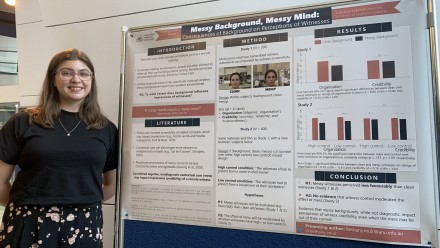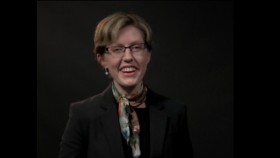Can a virtual background influence a witness’s credibility?
Bethany Muir's interest in the topic of bias in the criminal justice system started with a high school project investigating how people remember crimes.
“My year 12 research project taught me that numerous people have been imprisoned for crimes they did not commit. This was an eye opener,” Ms Muirs said.
Wanting to understand more about bias in the justice system, Ms Muir has delved into this area of research for a number of years. Firstly, during her Bachelor of Psychology (Honours) study, and now during her PhD study at the Australian National University.
In August of this year, Ms Muir will travel to Japan to attend and present her research findings at the Society for Applied Research in Memory and Cognition (SARMAC) thanks to a travel scholarship awarded to her by SARMAC.
“My research investigates how personal video backgrounds, for example Zoom or Microsoft Teams, affect first impressions, but more specifically do they affect impressions of people in virtual court rooms?,” Ms Muir outlined.
“The study I’m presenting in Japan looked at whether messy and cluttered rooms in video backgrounds lead to negative impressions of witnesses - lessening their credibility, compared to tidy and neat rooms.”
“We found that witnesses with messy backgrounds were seen to be less trustworthy, less accurate, and less credible than witnesses with tidy backgrounds.”
“This finding is worrying because the messiness or tidiness of a room is not truly diagnostic or relevant to the witness’s ability to recall information regarding a crime.”
“Perhaps more concerning is that this background bias persisted even when we told people the witness had little control over the background or the Zoom context from which they appeared” Ms Muir explained.
Ms Muir credits her supervisor, Dr Eryn Newman, for providing her support and advocacy throughout her PhD journey, and advised she would not have applied for the SARMAC travel scholarship or thought to present at the conference without Dr Newman’s encouragement.
“This will be my first talk at an international conference so it’s very exciting”
“The conference will host some of the leading scientists in the world from my research area — researchers whose work I have been following for over 8 years. It will be nice to match names to faces and hear what they’re working on at the moment.”
“Presenting is always a bit nerve-wracking, but I am always glad to hear questions and feedback and have conversations with people after the presentation. I have also never visited Japan, so that’s definitely a bonus!,” Ms Muir smiled.














